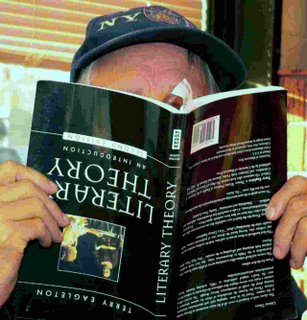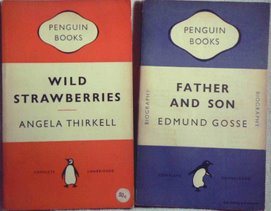Literature Buggers Reality: My Part-time Bookselling as Reflected in a 1972 E. L. Doctorow Novel – his Book of Daniel
The following text strikes me as a reminder that my friend’s bookstore exists as just one more example of a genre of radical-marginal-countercultural cliché which is continually being ‘thrown up’ and perpetuated by pseudo-prophets who start businesses that are doomed to fail financially because they are mere excuses for anti-social, isolated existence without a commitment to make them work as sources of income and as viable services to one’s community.
From a scan of: E. L. Doctorow, The Book of Daniel. New York, New American Library, 1972; p 49 --
-- where Daniel describes his biological father’s storefront radio repair shop:
On the bed of the window, resting on old curled crepe paper, bleached grey, are two display radios—a table model and a console with cloth-covered doors and a combination automatic record changer. When you go inside you see that the two window display radios have nothing inside them. They are empty cabinets. Not many people buy radios here. Mostly they have their old ones fixed. There is no irony in Paul Isaacson’s owning his own business, because he makes no profit. He employs no one and, therefore, exploits no one. Isaacson Radio, Sales and Repair, is not a good business. There were lots of poor or lower middle class people in that neighborhood. They all knew someone who could sell cheaper. And they did not support big repair bills. He was honest and he never overcharged. Rochelle, who kept the books at home, was supposed to figure out how to pay the rent each month.
(Sandra, a single mother of grown boys, has to figure that one out herself!)
Is my friend ‘Sandra’, the owner of the bookstore where I so recently worked (the place I have often described on this blog), setting herself up as a martyr? If so, could it be in close parallel to the scenario described in Doctorow's “Book of Daniel”? Is membership in a 'decade of revolt and reinventing values' sometimes not a stepping stone to selling out as a radical-chic or YUPPIE parvenu but (sometimes) more closely related to being a card-carrying commie? This has me wondering about the counter-cultural types versus the Marxist types in new ways.
I want to doubt it, disbelieve the remarkable similarities. Something makes me want to chalk it up to neurosis - as I think E. L. Doctorow was attempting . . at times . . in his fiction.
Maybe the phenomenon goes deeper than the parallel with radical history/biography (Sandra's as well as my own); maybe it is a similarity more related to persons who actively choose to remain marginal to the world of business and commerce, serving a ‘higher goal’, one that requires a personal sacrifice (effacement, in French) of ones personal identity behind piles of books, radios, or the paraphernalia of any trade -- a trade/profession that serves more as an excuse to avoid more than a supplement for engaging with real people in personally fulfilling relationships.
Do ideologues use their business and the objects of their failing professions as armor behind which they can hide their own real face, their intimate personality?
Background (from a student essay) displayed online HERE
QUOTE/
Daniel and his sister Susan are the fictional children of Julius and Ethel Rosenberg. In Doctorow’s novel they are called the Isaacsons. Like the real people they were modeled on, The Rosenberg’s were members of the Communist Party of the United States. They were charged with passing atomic secrets to the Soviet Union. How lower middle-class people from the Bronx got possession of atomic secrets to pass to the Russians was never explained by the American government of the day. In the novel Daniel’s father owns a small radio repair business and Daniel’s mother, Rochelle, is a housewife.
/END QUOTE
WARNING: This is a sample of an essay by a student who "just didn't know where to start. " You may copy the essay if you wish but please use it only as a guide to good writing. Turning it as your work would be plagiarism and could get you kicked out of school.
And for a bit of enthusiastic endorsement for E. L. Doctorow’s novel Book of Daniel with which I am in agreement, we might as well read the entry on ABE for a bookseller’s unusually long offer to sell the novel for $1.50:
Book of Daniel[Buy it!]
Doctorow, E L 1.50 Abebooks Daniel's Books
Bantam Doubleday Dell Softcover. Bantam Doubleday Dell 1983 Fine/ Unread, faintest wear, In plastic.
Description: The central figure of this novel is a young man whose parents were executed for conspiring to steal atomic secrets for Russia. His name is Daniel Isaacson, and as the story opens, his parents have been dead for many years. He has had a long time to adjust to their deaths. He has not adjusted. Out of the shambles of his childhood, he has constructed a new life-marriage to an adoring girl who gives him a son of his own, and a career (as a) scholar. It is a life that enrages him.
In the silence of the library at Columbia University, where he is supposedly writing a Ph.D. dissertation, Daniel composes something quite different. .It is a confession of his most intimate relation-with his wife, his foster parents, and his kid sister Susan, whose own radicalism so reproaches him. It is a of memories: riding a bus with his parents to the ill-fated Paul Robeson concert in Peekskill; watching the FBI take his father away; appearing with Susan at rallies protesting their parents" innocence; visiting his mother and father in the Death House.
It (the novel) is a(bout an) investigation: transcribing Daniel’s interviews with people who knew his parents, or who knew about them; and logging his strange researches and discoveries in the library stacks. It is a (story) of judgments of everyone involved in the case-lawyers, police, informers, friends, and the Isaacson family itself. It is a (book) rich in characters, from elderly grandmothers of immigrant culture to covert radicals of the McCarthy era to hippie marchers on the Pentagon. It is a (book) that spans the quarter-century of American life since World War II.
It is a (book) about the nature of Left politics in this country - its sacrificial rites, its peculiar cruelties, its humility, its bitterness. It is a about some of the beautiful and terrible feelings of childhood. It is about the nature of guilt and innocence, and about the relations of people to nations. It is The (Book) of Daniel.
1A-R2-C2 Daniel’s Books [Enumclaw, WA, U.S.A.]



No comments:
Post a Comment